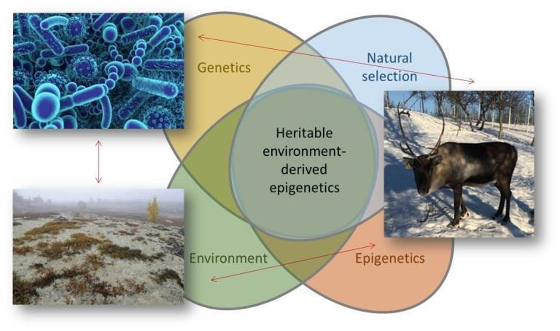Genetics in plant-herbivore systems
PhD Fellow in Genomic basis of eco-evolutionary responses to changing environments in arctic plant-herbivore systems

Human activities result in global transformation of the arctic ecosystems. Changes in species diversity are driving ecosystem response to both anthropogenic and natural biotic and abiotic factors. Knowledge at the species level as well as our improved ability to not only identify and detect species, but also capture physiological, biological and ecological state of targeted organisms, is therefore urgently needed in the face of global changes.
Along with climate change, herbivory is considered a main driver of ecosystem change in terrestrial arctic environments. The most abundant large herbivorous species in the Arctic, reindeer or caribou (Rangifer tarandus) has a complex network of biotic interactions including primary producers (e.g., plants, lichens and bryophytes), carnivore populations and humans and plays a central role in livelihoods and culture of indigenous peoples, providing essential ecosystem services to northern communities. Application of genetic and metagenomic/metabarcoding methods has greatly facilitated our understanding of evolutionary history, biology and physiology of this keystone species in the Holarctic. Yet, genetic variation at neutral genetic markers, that are often used in phylogeographic, population genetic or metagenomics/metabarcoding studies, do not capture physiological, biological and ecological status of targeted organisms. Epigenetic variation fills this gap by linking genomes to the environment and can account for the organisms' ecological background and to inform on short‐term/immediate responses to concurrent environmental changes.
The position focuses on increasing our understanding of long-term changes in northern ecosystems with a focus on plant-herbivore systems. You will be involved in the active ongoing eDNA research and develop genomic markers to characterize diet composition, gut microbiome and host to identify the relationship among the dietary diversity, gut microbiome and animal physiological state in response to seasonal and environmental changes. Reseach will be conducted as a part of the newly established Norwegian Centre for Arctic Ecosystem Genomics (ArcEcoGen) and will be part of the terrestrial working group. Research at the ArcEcoGen focuses on the combined effect of humans, climate, and biota on northern ecosystem dynamics in the past, present, and future using environmental DNA (eDNA) techniques. A key goal of ArcEcoGen is to build up a diverse, rigorous, and internationally leading research group in ecosystem genomics.
Candidate works closely with other PhDs and postdocs of the ArcEcoGen to integrate the contemporary ecology data with the results from sedaDNA analyses.
Please read more about ArcEcoGen and its projects here: https://uit.no/research/arcecogen, NEAT research group https://uit.no/research/neat?p_document_id=751263&Baseurl=/research/ and on-going REININ-project https://www.mn.uio.no/cees/english/research/projects/257642/